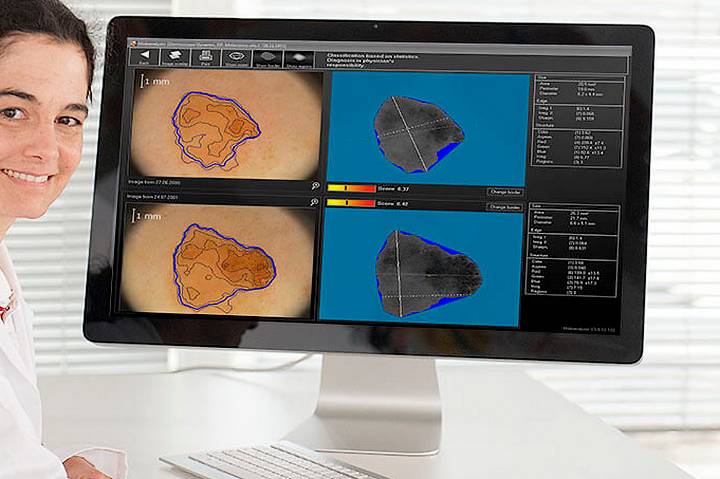
The latest digital imaging equipment has revolutionised dermatology in general and skin cancer management in particular.
Total body polarised dermoscopy is now available at our London clinic. The first in the UK to offer the procedure, where high resolution dermoscopy data can be taken from a series of standardised images.
Suspicious new, or changing moles, or lesions can be evaluated in detail by your consultant, with the back up of computer aided comparison to look for subtle changes.
The increased accuracy this brings helps to reduce surgical biopsies and improve detection of early stage cancers. This is important in monitoring patients at high risk of skin cancer, in particular melanoma.
Melanoma Monitoring
Melanoma can be a life threatening condition, not least without early detection. Monitoring is helpful for a range of patients, with a history of sunburn, red hair, previous organ transplants, or melanoma gene mutations.
For those with a large number of moles, or in particular anyone having previous melanomas, specialist monitoring becomes essential. If you have already had 2 malignant melanomas, there is statistically a 31% chance of another within 5 years.
Children of parents who have suffered from melanoma are also a high risk group, especially if they see a number of moles appear post puberty. Ensuring they are monitored matters and in the event there is an issue, paediatric melanoma treatment is available.
The information melanoma monitoring produces is significant at all ages and and for all at risk groups. Not least when usefully integrated with another state of the art approach.
Confocal Microscopy
Bringing together total body photography and digital dermoscopy is an advance, more so when reflectance confocal microscopy (RCM) is added into the equation. A procedure using a laser scanning microscope, where consultants can literally look beneath your skin.
This makes evaluation of changing lesions, or moles, which were picked up by digital dermoscopy, far more accurate. Unnecessary biopsies are avoided, with the number of issues needing further investigation significantly reduced.
Early detection is improved, which reduces treatment and improves outcome. This is the real advantage of the advanced solutions we use, they are there to improve our patients health and reduce their anxiety, good medical care.
Monitoring Approach
Choosing the approach above can be for a variety of individual reasons, from conditions such as atypical mole syndrome, to your family, or personal medical history.
The objective in a scientific sense is to assess melanocytic lesions and offer vital early intervention, where there is a problem. The combined procedures can also save time, or a need for supplementary appointments.
A further objective is equally important, to bring patients peace of mind. This is not about taking a series of photographs to be kept in your notes, or to take home. Melanoma, or any skin cancer monitoring, should be an active commitment by patient and dermatologist.
We have invested in the best equipment to enhance this commitment, because all our staff believe in the value of finding and treating skin cancers. If you would like to take part in a monitoring program, or to talk through the options, please get in touch.
You may find the options below useful:
- Save time with an intuitive search on: Skin Cancer Diagnosis & Treatment.
- Up to date news, research and insights: Our Dedicated Skin Cancer Blog.
For any advice, or to arrange a dermatology appointment, call 020 8441 1043, or send an email via the Make An Appointment button below.
